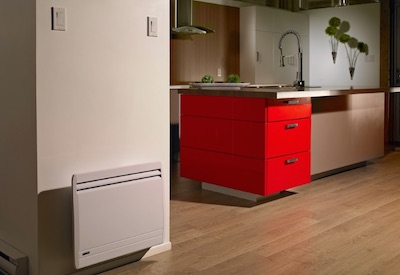Is Electric Baseboard Heating Still Relevant?

Sept 4, 2018
By Owen Hurst
A point of discussion that I have heard many times from end users is their concern over electric baseboard heating, and electric heating in general. Now let’s be clear, much of the concern comes from those who have experience with older baseboard heating, in older homes, that was the primary or only source of heat.
Older baseboards can be highly inefficient and cost an arm and a leg. However, the time of your grandparent’s baseboard heaters is long gone.
Today baseboard heaters are much more efficient than their older counterparts, and when used as a secondary heating source, or even as the primary, the results are drastically different from 20 years ago. Couple new baseboards with properly insulated homes and an advanced control system, and their use offers a lot of appeal.
Factors to consider
One of the most important is the cost of electricity, which largely depends on the type of power generation in your area. If we look at the U.S., nearly 35% of homes operate on some form of electric heat, which can be expensive if you live in one of the many states that use coal and oil to produce electricity. And with the current administration’s drive to reinvigorate the coal industry, it is unlikely this trend will shift.
Overall, Canadian hydro costs are lower and will continue to be as we embrace renewable energy rather than relying on non-renewables. For example, Hydro-Québec examined 22 major North American cities’ residential hydro bills: 11 in the US and 11 in Canada. The top six cities with the lowest hydro bills were Canadian. Further, many energy analysts advocate that renewables (i.e., wind, solar) are now just as cost effective when producing a kilowatt of clean energy as fossil fuels. And with electricity being the best option for clean energy, embracing electric heating is an investment in the future.
Typicallybaseboards used to need 10 watts to heat each square foot of a room. With proper insulation and airtight homes, that number is now roughly 7 watts per square foot. Also, ensuring correct placement and distribution of baseboards can ensure even heat throughout the home, and using a central control system rather than individual thermostats on each heater can cut costs and increase overall performance.
Beyond that, new baseboards have model variants that effectively heat better than traditional resistance baseboards. For example, convector baseboards direct air up rather than out so there is less chance of obstruction blocking heat. These baseboards can even be placed behind furniture if the user’s preference is to have the heater out of site.
Finally, it needs to be noted that some disagreement remains among experts with regard to the efficiency and future of baseboards, as many prefer to advocate for natural gas heating, which is currently the primary form of heating in North American homes. However, gas, oil and coal are not renewable. While fracking has allowed us to access natural gas on a level previously thought to be beyond our grasp, this too has an impact on the environment and will eventually run out. The best option we have for a sustainable future is renewable energy.
So, there is more to consider when thinking about using electric baseboard heating than simply the cost. Therefore, baseboard heating is not only still relevant, but advances in technology have made them quite efficient and one of the few potentials capable of carrying us into a future that will be more focused on clean energy.
Owen Hurst is Managing Editor of EIN’s sister publication, Panel Builder & Systems Integrator: http://panelbuildersystemsintegrator.ca
Photo: Convectair
Sources






![Guide to the Canadian Electrical Code, Part 1[i], 26th Edition– A Road Map: Section 56](https://electricalindustry.ca/wp-content/uploads/2022/11/Guide-CE-Code-2-768x432.png)



![Guide to the Canadian Electrical Code, Part 1[i], 26th Edition– A Road Map: Section 56](https://electricalindustry.ca/wp-content/uploads/2022/11/Guide-CE-Code-2.png)



